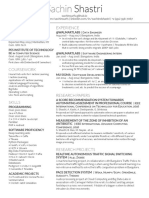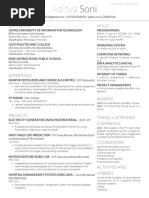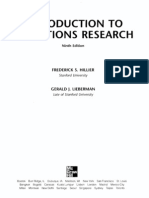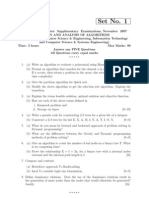0 ratings0% found this document useful (0 votes)
60 viewsMachine Learning For Data Science Using Python 2022
This document provides information about a 30-hour machine learning course being offered over 15 days from November 14th to 29th, 2022. The course will be coordinated by Dr. Venkateswara Rao Kagita and held online from 6-8 PM with 2 hours of classes daily. Students will gain hands-on experience with Python while working on real-world projects covering topics like regression, classification, clustering, neural networks, and recommendation systems. The registration fee is Rs. 1000 for academic participants and Rs. 2000 for industry professionals.
Uploaded by
Pandurang UpparamaniCopyright
© © All Rights Reserved
Available Formats
Download as PDF, TXT or read online on Scribd
0 ratings0% found this document useful (0 votes)
60 viewsMachine Learning For Data Science Using Python 2022
This document provides information about a 30-hour machine learning course being offered over 15 days from November 14th to 29th, 2022. The course will be coordinated by Dr. Venkateswara Rao Kagita and held online from 6-8 PM with 2 hours of classes daily. Students will gain hands-on experience with Python while working on real-world projects covering topics like regression, classification, clustering, neural networks, and recommendation systems. The registration fee is Rs. 1000 for academic participants and Rs. 2000 for industry professionals.
Uploaded by
Pandurang UpparamaniCopyright
© © All Rights Reserved
Available Formats
Download as PDF, TXT or read online on Scribd
You are on page 1/ 2
Organized by Department of CSE
30 hours Course
Coordinator and Instructor:
✓ 15 days course on
Dr. Venkateswara Rao Kagita
venkat.kagita@nitw.ac.in
✓ Two hours per day. Machine Learning for
✓ Flexible timings 6-8 PM Data Science
6281746931
✓ Hands-on experience with Python.
using Python
(November 14th – 29th, 2022)
✓ Real-world projects.
In association with Center for Continuing
✓ Online course.
Education (CCE), NIT Warangal
➢ Introduction ➢ Clustering
What is Data Science, Real-life examples and Different clustering approaches and applications.
Applications, Data Scientist roles, Machine ➢ Feature Engineering
Learning vs. Data Science vs. AI, Machine Feature Scaling, Feature Selection: Filter methods,
Learning types, Generics of ML approaches. Wrapper methods, Embedded methods.
➢ Python Essentials ➢ Dimensionality Reduction
Data manipulation tools, NumPy, Pandas, Principal component analysis, Linear discriminative
Visualization, Scikit-Learn. analysis, Multiple discriminant analysis.
➢ Probability and Statistics for Data Science ➢ Neural Networks
Basic probability theory, Random variables, Introduction to neural networks, Back propagation
Probability distributions, Markov models, Bayesian
learning, Applications.
algorithm and theory behind, Introduction to deep
learning.
Where Technology Meets Innovation
➢ Regression Analysis ➢ Reinforcement Learning
Univariate linear regression, Multivariate linear Markov Decision Process, Planning, Estimation,
regression, Polynomial Regression, Applications. Control and Applications.
➢ Classification ➢ Recommendation Systems
Logistic regression, SVM, Multi-class SVM, Introduction, Types of recommender systems,
Decision trees, Applications. Content-based, Collaborative filtering: Matrix Registration Fee
➢ Ensemble Approaches factorization based approaches, Knowledge- Account Details
Bagging, Random Forests, Boosting: Adaboost, based, and Hybrid techniques, Times series
Gradient boosting, Applications. forecasting, other real time examples. Category Amount Account 62403680215
➢ Optimization ➢ Hands-on to the majority of the topics using Number (Savings Account)
Gradient descent, Stochastic gradient descent, Python.
Account Center for
Batch gradient descent. Academic Rs. 1000/-
Name Continuing
Education NITW
Projects Bank Name: State Bank of India
House price prediction using Customer churn prediction using Handwriting digit recognition Industry Rs. 2000/- Branch: NIT Warangal
regression techniques. decision tree & ensemble using neural network.
approaches. IFSC Code SBIN0020149
Diabetics prediction using logistic Color compression using K- Self-Driving Cabs using Q-Learning
regression. means clustering Registration link: https://forms.gle/hvxHQoTevZecWE5x6
Enter ‘DSMLM’ code in the remarks while making payment so
‘
that it is easy for us to track.
You might also like
- Certification Course On: Machine Learning For Data Science Using PythonNo ratings yetCertification Course On: Machine Learning For Data Science Using Python2 pages
- Nirwan Banerjee: Integrated M.Tech - Mathematics and Computing - IIT, DhanbadNo ratings yetNirwan Banerjee: Integrated M.Tech - Mathematics and Computing - IIT, Dhanbad1 page
- Ginni Garg: Grade School/College Duration CGPA/%No ratings yetGinni Garg: Grade School/College Duration CGPA/%2 pages
- Resume Amazon Applied Scientist IISc 2022No ratings yetResume Amazon Applied Scientist IISc 20221 page
- 9 Intelligent Crop Recommendation System Using Machine LearningNo ratings yet9 Intelligent Crop Recommendation System Using Machine Learning6 pages
- INF554: M L I E P AXA Data Challenge - Assignment: 1 Description of The AssignmentNo ratings yetINF554: M L I E P AXA Data Challenge - Assignment: 1 Description of The Assignment6 pages
- Sample Problem For Selection of Investment AlternativesNo ratings yetSample Problem For Selection of Investment Alternatives5 pages
- Introduction To Operations Research: Ninth EditionNo ratings yetIntroduction To Operations Research: Ninth Edition8 pages
- Donald Davendra (Ed.) - Traveling Salesman Problem, Theory and Applications - InTech (2010) PDFNo ratings yetDonald Davendra (Ed.) - Traveling Salesman Problem, Theory and Applications - InTech (2010) PDF336 pages
- Diffie-Hellman Key Exchange Man-in-the-Middle Attack Elgamal Cryptographic SystemNo ratings yetDiffie-Hellman Key Exchange Man-in-the-Middle Attack Elgamal Cryptographic System24 pages
- Block Ciphers and The Data Encryption Standard (DES)No ratings yetBlock Ciphers and The Data Encryption Standard (DES)17 pages
- Shree Swaminarayan Institute of Technology, Bhat: Computer Engineering Department Subject: Information Security (3170720)No ratings yetShree Swaminarayan Institute of Technology, Bhat: Computer Engineering Department Subject: Information Security (3170720)3 pages
- Rr210504 Design and Analysis of AlgorithmsNo ratings yetRr210504 Design and Analysis of Algorithms4 pages
- Lecture 8 - Supervised Learning in Neural Networks - (Part 1)No ratings yetLecture 8 - Supervised Learning in Neural Networks - (Part 1)7 pages
- Unit 5: Advanced Optimization Techniques (M.Tech)No ratings yetUnit 5: Advanced Optimization Techniques (M.Tech)10 pages
- T02640020220124069T0264-14 Probabilistic Reasoning Over TimeNo ratings yetT02640020220124069T0264-14 Probabilistic Reasoning Over Time32 pages
- Chapter 6 Continuous Probability DistributionNo ratings yetChapter 6 Continuous Probability Distribution47 pages
- Dnyansagar Institute of Management and Research: Artificial Intelligence Is AboutNo ratings yetDnyansagar Institute of Management and Research: Artificial Intelligence Is About24 pages
- Ch-4 Dynamic Characteristics of InstrumentsNo ratings yetCh-4 Dynamic Characteristics of Instruments52 pages
- Machine Learning Based Crime Rate Analysis Using PythonNo ratings yetMachine Learning Based Crime Rate Analysis Using Python7 pages
- Patter Recognition (Spring 2015) Midterm ExamNo ratings yetPatter Recognition (Spring 2015) Midterm Exam4 pages
- How To Encipher and Decipher Codes Using The Hill 2-CipherNo ratings yetHow To Encipher and Decipher Codes Using The Hill 2-Cipher17 pages

























































































